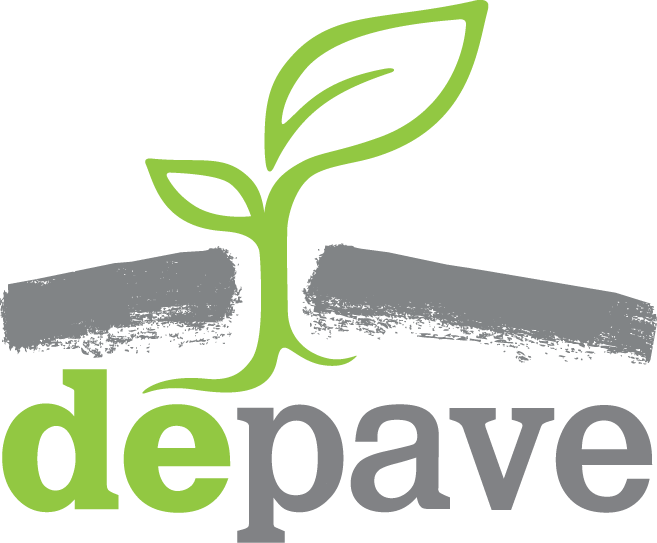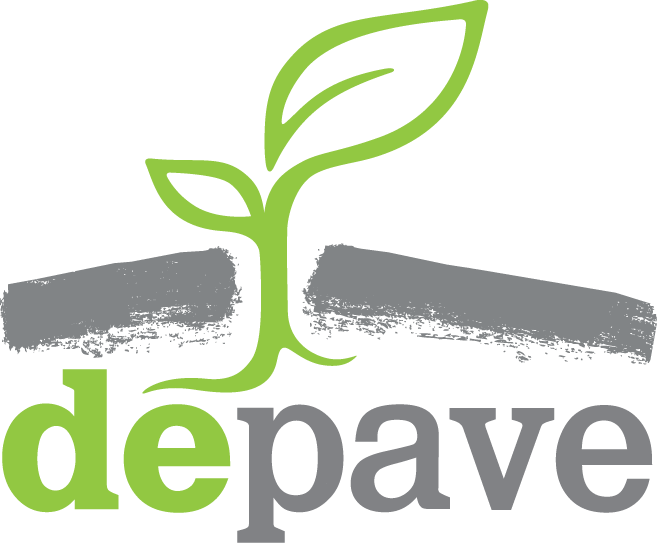
advocacy
The depave movement is part of the larger tactical urbanism movement, to create more compact, accessible, equitable, ecological, healthy, and humane cities, which are better able to weather ongoing climate change. Depaving is an essential tool to retrofit our cities, to combine green and grey infrastructures in creative ways to mitigate urban runoff and heat, and to remedy inequitable access to nature. Across the USA, there is an urgent need to reform local government land use rules and plans, to legalize an array of essential climate mitigation and adaptation measures - including pavement removal.
Depave has worked in Oregon at the State and local scales to reform outdated parking requirements that create heat islands. We have built coalitions with environmentalists, as well as housing reform and active transportation/transit advocates to relax parking requirements and create opportunities to incentivize urban trees and pocket greenspaces, accessible and affordable housing choices, and transportation alternatives to the automobile.
In coalition, we have advocated for improved transit and bike infrastructure, affordable housing investments, as well as regional parks and nature funding - which are essential to fuel community-led greenspace restoration. We have spoken out to support and defend green infrastructure funding and programs, which are essential to climate mitigation and adaptation in cities. In recent years, Depave has become more attuned to traffic violence, and automobile domination of the public sphere.
Depave’s project-based work has fueled insights into the many, and multi-faceted ways that automobile domination and urban sprawl undermine community health, well-being and resilience. We believe our project work makes us better advocates.
Depave has completed a series of preschool nature playgrounds, typically hosted at churches. One challenge we face on these projects is various local government permitting requirements, especially those associated with ‘conditional uses’ and parking. Currently, Depave is tracking an initiative led by the Oregon Department of Land Conservation and Development to evaluate and report on permitting barriers to childcare facilities in Oregon. Through this initiative we aim to reduce barriers to nature playground and greenspace retrofits at churches and other community hubs.
Our Statement on Defunding the Police & Reinvesting in Communities
Depave believes everyone should have access to the environment and feel safe in their communities. We believe in investing in inclusive, sustainable, and resilient communities that prioritize Black, Indigenous, and People of Color (BIPOC) who have been and continue to be denied equal access to basic human rights including housing, education, food, and access to green spaces.
We know that BIPOC continue to be over-policed, intimidated, and harmed by the police. As of 2018, a Black person is five times more likely to be stopped by a police officer without just cause than a white person (1). As of 2021, the adopted Portland Police Bureau budget is approximately 35% of the total discretionary general fund (2), 44% of which is allocated towards precinct patrol (2). This is not unique to Portland. Police budgets across the country regularly account for 20 – 40% of city general fund budgets. We believe police budgets should be reduced and funding should be reallocated towards social services and reinvestment in Black communities.
We acknowledge the leadership and expertise of partners at Imagine Black (3) and Don’t Shoot Portland (4), and endorse their statements and demands.
Cited References:
1. Pew Research Center - 10 things we know about race and policing in the U.S.
2. https://www.portlandoregon.gov/cbo/article/764227
3. imagineblack.org/defundpolice
Image from: For Everyone Collective


